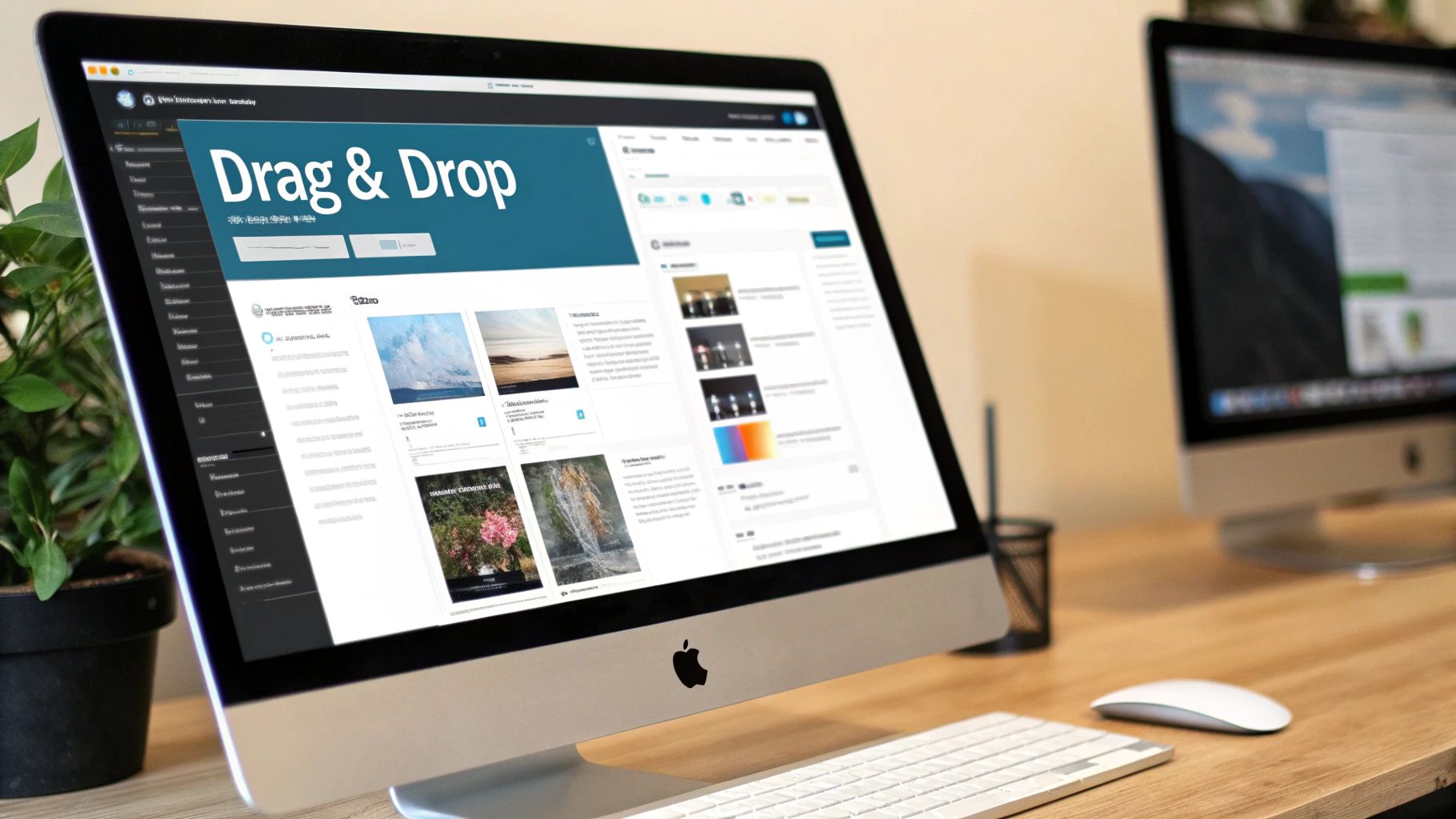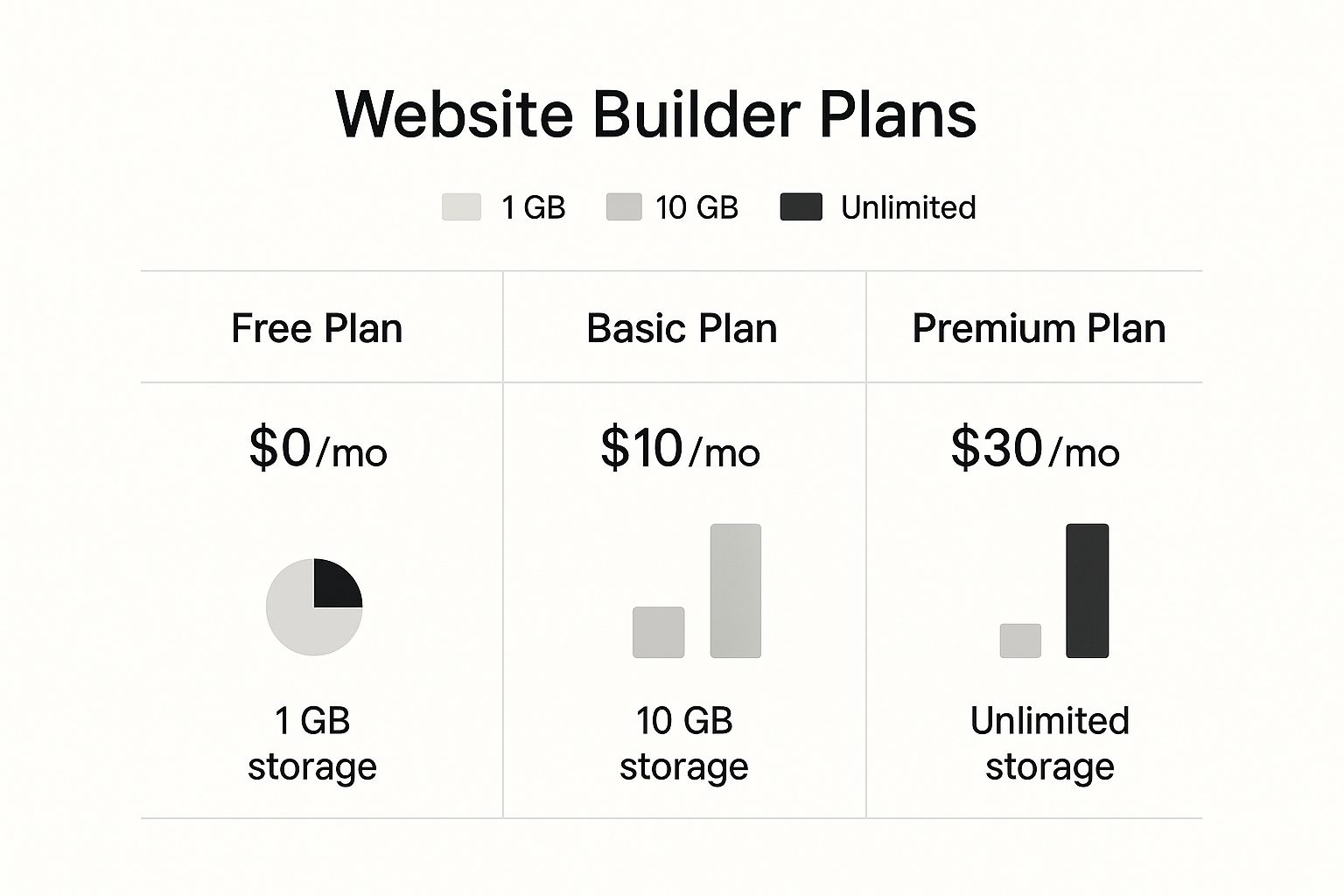For a lot of small business owners, the perfect website solution is an all-in-one platform like Wix or Squarespace. They offer simple drag-and-drop tools and affordable monthly plans that let you get a professional-looking site online in a weekend, without ever needing to write a single line of code.
Your Website Is Your Digital Front Door
Think of a website builder as a complete toolkit for creating your online storefront. Instead of hiring a construction crew (coders and developers), you get a set of high-quality, pre-made modules you can arrange yourself to build something beautiful and functional.
It's like the difference between building a house from scratch and assembling a high-end prefab home. Both results are impressive and sturdy, but one is way faster and more straightforward. This approach takes the mystery out of the tech by bundling everything you need—design, features, and hosting—into one simple subscription.
Taking Control of Your Online Presence
The real magic of using a website builder is the control it hands you. This direct access means you can be nimble, updating your site on the fly in response to customer feedback or a new idea, without waiting on a developer or racking up extra costs.
A modern website builder usually comes with:
- Beautiful Templates: Professionally designed layouts that give you a great-looking starting point from day one.
- Drag-and-Drop Editors: Intuitive tools that let you click, drag, and place text, images, and other elements exactly where you want them.
- Built-in Hosting: This is the digital "land" your website lives on. The platform handles all the technical server stuff, so you don't have to.
This all-in-one model turns website creation from a complicated, expensive headache into a totally manageable project. It puts the creative and strategic power right back into your hands—exactly where it should be.
Once you’ve built your digital front door, you need to make sure local customers can actually find it. That’s where learning some effective local SEO strategies for small businesses becomes so important. With these platforms, managing your online presence stops being a chore and starts being a natural part of running your business.
Why a Website Builder Can Be Your Small Business’s Secret Weapon
When you're running a small business, every dollar and every minute counts. Choosing a website builder isn't about cutting corners; it's about making a savvy, strategic move that frees up cash and helps you get online fast. It’s a decision that prioritizes efficiency, letting you compete with the big guys right from the start.
One of the most compelling reasons is the predictable cost. A custom-coded website can easily run into five figures upfront—a massive chunk of change that could be spent on inventory, marketing, or just keeping the lights on. Website builders swap that daunting investment for a low, manageable monthly subscription.
This simple shift in payment structure removes a ton of financial stress and lets you put your money where it can make a real difference, right now.
Launch in Days, Not Months
Beyond the savings, the sheer speed is a game-changer. The traditional route of hiring a developer often involves a long, drawn-out process of meetings, mockups, coding, and endless testing that can take months.
With a website builder, you can take an idea and turn it into a live, professional, and fully functional website in a matter of days. That means you can start connecting with customers, trying out marketing campaigns, and bringing in revenue almost immediately. In a fast-moving market, that kind of agility is priceless.
You're in the Driver's Seat
Maybe the best perk of all is the control it gives you. In the not-so-distant past, simple updates—like changing your store hours, adding a new service, or posting a holiday sale—meant calling a developer, waiting for them to get to it, and paying an invoice for their time. It was slow, expensive, and frustrating.
A website builder puts the power back in your hands. You can make changes instantly, on your own schedule, without needing to know a single line of code. This isn’t just about saving a few bucks; it’s about having the freedom to run your business at your own speed.
This shift is why the website builder market is booming. It’s on track to become a $2.32 billion industry by 2025, largely because small businesses are flocking to these platforms for an affordable, user-friendly way to get online. The trend makes one thing clear: a professional website is no longer optional for building credibility and growing your brand.
At the end of the day, using a website builder is a cornerstone of a smart digital strategy for any small business. It levels the playing field, giving you access to powerful tools that were once out of reach. For more ideas on growing your business online, check out our insights on digital strategy.
Comparing The Top Website Builder Platforms
Picking the right website builder for your small business can be overwhelming. There are so many options out there, and they all claim to be the best. But here’s the secret: the "best" one is simply the one that fits your specific needs.
Think of it like choosing a vehicle. You wouldn't buy a sports car to haul lumber, and you wouldn't take a semi-truck on a family road trip. It’s all about matching the tool to the task at hand.
Let's cut through the marketing noise and look at the heavy hitters—Wix, Squarespace, Shopify, and WordPress. We’ll break down who they’re really for, so you can make a choice that actually helps your business grow.
Wix: The Creative Playground
If you want total creative control without writing a single line of code, Wix is your sandbox. Its drag-and-drop editor is famous for its flexibility—you can literally put anything, anywhere. This is a dream come true for service-based businesses like consultants, restaurants, or artists who need a truly unique online presence.
Wix offers a massive library of templates to get you started and an app market to add extra features like booking systems or forums. The only downside? All that freedom can sometimes feel like a blank canvas, which might be a bit much for absolute beginners.
Squarespace: The Visual Showcase
When it comes to pure, polished aesthetics, Squarespace is the undisputed champion. It’s the perfect website builder for small business owners in creative fields—think photographers, designers, and architects. The templates are gorgeous right out of the box, making it incredibly easy to build a site that looks like it cost a fortune.
Instead of Wix's total freedom, Squarespace provides a more structured editing experience. This isn't a limitation; it's a feature. It gently guides you toward good design, making it nearly impossible to create a messy or unprofessional-looking layout.
The infographic below gives you an idea of how pricing tiers for these builders often work. As you can see, a small step up in your monthly fee can unlock a lot more power.
Often, investing just a little more per month opens up critical features like more storage or advanced sales tools—things you'll definitely need as you grow.
Shopify: The E-Commerce Powerhouse
If your main goal is selling products online, stop looking and just go with Shopify. It's more than a website builder; it's a complete e-commerce machine. Everything about it is designed from the ground up to help you manage inventory, process payments, and handle shipping with ease.
While other builders tack on e-commerce as a feature, it's Shopify's entire reason for being. For a deeper dive into how it stacks up against other sales-focused platforms, this detailed comparison of platforms like Payhip and Shopify is a great read. If you’re serious about selling, Shopify is built to scale with you.
WordPress: The Scalable Workhorse
And then there's WordPress. This isn't just another builder; it's a full-blown open-source content management system (CMS), and it's in a league of its own. This is the platform for the business owner with big ambitions who wants total control and limitless potential for growth.
Yes, the learning curve is steeper. You'll be responsible for your own hosting and maintenance. But the payoff is unparalleled power and flexibility. The numbers don't lie: WordPress powers an incredible 43.3% of all websites and dominates the CMS market with a 62.7% share. It's the engine of the internet for a reason.
Website Builder Comparison for Small Businesses
To make things even clearer, here's a side-by-side look at the top website builders, focusing on the features that matter most to small business owners.
| Platform | Best For | Ease of Use | Starting Price (Monthly) | Key Feature |
|---|---|---|---|---|
| Wix | Creative Freedom & Service Businesses | Very Easy | ~$17 | Highly flexible drag-and-drop editor |
| Squarespace | Portfolios & Visually-Driven Brands | Easy | ~$16 | Award-winning, beautiful templates |
| Shopify | E-commerce & Online Stores | Moderate | ~$29 | All-in-one commerce platform |
| WordPress | Long-Term Growth & Full Control | Challenging | Varies (hosting) | Limitless customization via plugins |
Ultimately, the right choice boils down to your primary goal. Go with Wix for creative control, Squarespace for stunning design, Shopify for selling products, and WordPress when you're ready to build something that can grow with you indefinitely.
Must-Have Features for Your Business Website
A great website is so much more than a pretty online brochure. Think of it as your most dedicated employee—one that works around the clock to generate leads, close sales, and build your brand.
When you're picking a website builder for small business, it’s tempting to get dazzled by flashy templates. But it's what's under the hood that really counts. You need to make sure the platform provides the core features that actually turn visitors into paying customers.
Foundational Tools for Growth
Some features are just non-negotiable in today's world. They're the absolute foundation of a good user experience and are essential for getting your business found online. Don't even consider a platform that doesn't offer these basics from the get-go.
Here’s what you should be looking for:
- Mobile Responsiveness: Your site absolutely must look and work flawlessly on smartphones. With over 60% of all web traffic now coming from mobile devices, a site that isn't mobile-friendly is basically invisible to most of your audience.
- Built-in SEO Tools: SEO, or Search Engine Optimization, is how customers find you on Google. A good builder will give you simple tools to tweak page titles, meta descriptions, and image alt text. This gives you a fighting chance to rank well without needing a degree in digital marketing.
- Contact Forms & Map Integration: Don't make people work to give you their business. Simple contact forms and an embedded map showing your location are fundamental tools for turning a curious browser into a real lead.
Think of these as the bare minimum. They ensure your site is accessible, discoverable, and easy to use, setting the stage for everything else.
Driving Revenue and Making Decisions
Once you have the basics down, you can focus on features that directly impact your bottom line and give you the data to make smarter decisions. These are the tools that turn your website from a static pamphlet into a true engine for growth.
For anyone selling products or services online, e-commerce functionality is a must. This means having secure payment options, a way to manage inventory, and tools for handling shipping. The best builders make setting up a store surprisingly simple, so you can start making money fast.
Just as important are analytics and reporting. Most of the top website builders connect easily with tools like Google Analytics. This gives you priceless information about who's visiting your site, how they found you, and what they do once they're there.
A website without analytics is like driving with your eyes closed. You might be moving, but you have no idea where you're going or what obstacles are in your way.
This data is pure gold. It helps you figure out what's working (and what's not) so you can continually improve your site and marketing efforts. If you're ready to get started, our guide on how to build a website is a fantastic resource that walks you through the entire process.
Understanding the Trade-Offs and Limitations
Choosing a website builder is a fantastic way for a small business to get online quickly and affordably, but it’s crucial to go in with your eyes open. There are always trade-offs.
Think of it like buying a beautiful prefabricated home instead of building one from the ground up. The prefab model gets you moved in fast and for a lot less money, but you can’t just decide to knock down a wall or add a new wing whenever you feel like it. Website builders work in a similar way. They’re wonderfully convenient, but they operate as closed systems, meaning you're limited to the features, designs, and tools their platform provides.
The Challenge of Platform Lock-In
One of the biggest hurdles you can face down the line is something called platform lock-in. When you create your site on a platform like Wix or Squarespace, your website doesn't just use their tools—it lives there. It’s not a simple folder of files you can just download and move to another web host if you find a better deal or outgrow the service.
If you ever decide to leave, migrating your site is almost always a painful, manual process. You’ll likely have to rebuild it piece-by-piece on a new platform, which costs a lot of time and money. You’re essentially just renting your digital space, and moving out means leaving the building’s structure behind. This is a massive consideration for your long-term strategy, because the business you have today might have very different needs five years from now.
"Platform lock-in is the hidden cost of convenience. While builders get you online fast, they can make it difficult to pivot or scale your digital presence in the future without starting from scratch."
Hitting the Design and Performance Ceilings
Another trade-off is what I call the design ceiling. The templates are a brilliant starting point, no doubt. But as your brand finds its voice and develops a unique identity, you might find those templates start to feel a bit confining.
Maybe you can't quite get the layout you envisioned or add a specific custom feature your customers are asking for. You're always working within the creative boundaries the platform has set for you.
Performance can also become a headache over time. It’s incredibly easy to add cool apps and plugins to your site, but every single one adds a bit of code and weight. A site loaded down with too many add-ons or large, unoptimized images will inevitably slow down. And a slow website doesn't just annoy visitors—it can seriously hurt your Google rankings, making it that much harder for new customers to find you.
Ultimately, picking the right website builder for your small business is about striking a smart balance between what you need right now and where you want to go in the future.
When Your Business Is Ready to Go Custom
A website builder for small business owners is a fantastic launchpad. It gets you online fast and without breaking the bank. But what happens when your business really takes off and you start bumping up against the limits of that launchpad?
Think of it this way: outgrowing your website builder isn't a problem, it's a sign of success. It means your business is thriving, your needs are getting more complex, and you're ready to climb to the next level. This is an exciting moment for any company.
Signs You Have Outgrown Your Builder
The first step is recognizing that you've hit a ceiling. You've probably reached this point if you find yourself thinking "if only my website could…" more and more often.
Here are a few clear signs that it might be time to graduate from a DIY platform:
- You Need Specialized Features: Your business now requires something a builder just can't handle, like a custom customer portal, a multi-vendor marketplace, or a dynamic booking system tailored to your unique services.
- Your Brand Is Too Unique for a Template: You’ve developed a strong, distinct brand identity that no pre-made template can truly capture. You need a design that is 100% yours, not one that fits into a common, recognizable layout.
- Deep Integrations Are Necessary: Your daily operations rely on your website talking seamlessly with specific CRM, ERP, or other third-party software, and a simple plugin just won't cut it anymore.
Moving from a builder to a custom-built site is a strategic investment in your future. It’s about creating a true digital asset that can scale with your business, not one that holds you back.
This is the point where you stop looking for off-the-shelf tools and start thinking about a bespoke solution. Making this leap involves a completely new set of decisions. Our guide on how to choose a web design agency can help you navigate this process and find the right partner for the job.
Frequently Asked Questions
Jumping into the world of website builders often brings up a few common questions. Let's tackle some of the big ones that most small business owners have before they take the plunge.
How Much Does a Small Business Website Really Cost?
You’ve probably seen the ads for website builders promising a new site for a low monthly fee, usually somewhere between $16 to $30. But it's important to look at the whole picture. That sticker price typically just covers the basics: web hosting and access to their building tools.
Think of it like a base model car. You’ll also need to budget for a few other things that are often sold separately:
- A custom domain name (your very own www address)
- A professional email address that matches your new domain
- Premium apps or plugins for any special features you might need
These extras aren't huge expenses on their own, but they can definitely add up. It’s always a good idea to factor them into your total budget right from the start.
Can I Move My Website to Another Builder Later?
This is a huge one, and something you absolutely need to know. For most all-in-one builders like Wix or Squarespace, the answer is a hard "no." They don't make it easy to pack up your site and move.
This is often called platform lock-in. Your website is built on their unique system, and you can't just download the files and upload them to a new host. If you decide to switch providers down the road, you're almost always looking at a complete rebuild from square one. It's a critical factor to consider, especially when thinking about where your business might be in a few years.
Do I Need to Be an SEO Expert?
Not an expert, no, but you can't be completely hands-off either. Most modern builders come with some decent, built-in SEO tools that let you handle things like page titles and meta descriptions. These are a great starting point.
But the tools alone won't get you traffic. Think of it this way: the builder gives you a car, but you still have to learn the rules of the road to get where you want to go. You’ll need to grasp the basics of SEO, like finding the right keywords and creating content that your customers actually want to read.
Ready to build a website that grows with your business? The team at Sugar Pixels specializes in creating custom web solutions that go beyond templates, giving you the power and flexibility you need to succeed. Learn more about our web design services.



